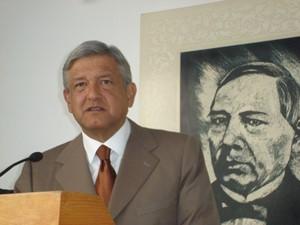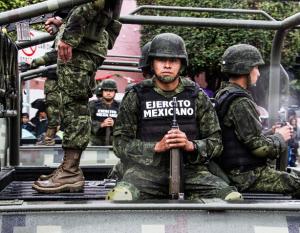Last Sunday, leftist politician Andres Manuel López Obrador -- often referred to with the acronymic AMLO -- won the Mexican presidency in a landslide. When he takes office in December, with his party in control of both houses of the Mexican Congress, Mexico's drug policies are likely to see some radical changes.

That AMLO -- and Mexico -- want change is no surprise. A vigorous campaign against the country's powerful and violent drug trafficking organizations -- the so-called cartels -- unleashed by rightist president Felipe Calderon in 2006 brought the Mexican military into the fight, but instead of defeating the cartels, the campaign, still ongoing under President Enrique Pena Nieto, has instead led to record levels of corruption and violence.
In 2012, when both the U.S. and Mexico had presidential elections and the drug war death toll was around 15,000, Mexico's drug prohibition-related violence was big news north of the border. But in the years since then, as US attention to Mexico's drug wars wavered, it's only gotten worse. Last year, Mexico saw more than 30,000 murders, and the cumulative drug war toll in the past dozen years is more than 200,000 dead and tens of thousands of "disappeared."
But the toll runs deeper than just a count of the casualties. The relentless drug war violence and the endemic corruption of police forces, politicians, and even sectors of the military by cartels have had a deeply corrosive effect on the citizenry and its belief in the ability of the country's political institutions to address the problem.
López Obrador, the former mayor of Mexico City, campaigned heavily on the need for change, especially around drug policy, corruption, and public safety. "Abrazos, no balazos" ("hugs, not gunfights") was one of his favorite campaign slogans. AMLO campaigned cautiously, hammering away at crime, corruption, and violence and mentioning different drug policy-related changes, but not coming out with specific policy proposals. Still, from his own remarks and those of people who will be assuming key positions in his administration, we can begin to sketch an outline of what those policies may look like.
Marijuana Legalization
Mexico is one of the world's largest marijuana producers (although the local industry has been taking a hit in recent years from completion north of the border), it has decriminalized the possession of small amounts of the herb, and it has legalized medical marijuana.
AMLO's pick for interior minister, former Supreme Court official Olga Sánchez Cordero has made no secret of her plans to seek full legalization and said this week that AMLO may seek a public referendum to gauge popular support for it. "Why maintain pot prohibition when Canada and US states are legalizing it, she said. "What are we thinking? Tell me. Killing ourselves. Really, keep on killing when... North America is decriminalizing?"
Drug Legalization
The possession of personal use amounts of all drugs has been decriminalized in Mexico since 2009, but that hasn't stopped the violence. AMLO and his advisors say he is open to considering taking the next step and legalizing all drugs.
"We'll analyze everything and explore all the avenues that will let us achieve peace. I don't rule out anything, not even legalization -- nothing," AMLO told the New Yorker during the campaign.
"The war on drugs has failed," wrote Sánchez Cordero. "Nothing contributes to peace by legislating on the basis of more criminal punishment and permanent confrontation. Violence is not fought with violence, as López Obrador rightly points out."
Drug legalization would be a radical step, indeed. It probably isn't going to happen under AMLO, since that would pit Mexico not only against the US, but also against the international anti-drug treaties that serve as the legal backbone of global drug prohibition. But he is putting the idea squarely on the table.
Amnesty
As a candidate, AMLO floated the idea of amnesty for those involved in the drug trade, a notion that created huge controversy and forced his campaign to clarify that it did not mean cutting deals with bloody-handed cartel leaders or their henchmen. Instead, his campaign clarified, he was referring to peasants growing drug crops and other low-level, nonviolent workers in the illicit business.
"Kidnappers? No," said Sánchez Cordero about possible amnesty recipients. "Who? The people working in rural areas, who are criminals because they work in the illegal drug business, but haven't committed crimes such as murder or kidnapping."

For the past 12 years, the Mexican military has been called on to fight the cartels and suppress the drug trade. But the level of violence has only increased, the military is implicated in massive human rights violations (as can only be expected when a government resorts to soldiers to do police work), and finds itself subject to the same corrupting influences that have turned state and local police forces into virtual arms of the competing cartels.
With regard to cartel violence, AMLO repeatedly said on the campaign trail that "you don't fight fire with fire" and that what was needed was not soldiers on the streets, but social and economic assistance for the country's poor and unemployed -- to give them options other than going to work for drug gangs. Just this week, AMLO announced a $5 billion package of scholarships and job training support for the young.
Still, AMLO isn't going to send the soldiers back to the barracks immediately. Instead, says one of his security advisors, his goal is to do it over the next three years. He has also proposed replacing the military presence in the drug war with a 300,000-person National Guard, composed of both military and police, a notion that has been bruited by earlier administrations as a means of effectively replacing tainted state and local police participation.
Here, AMLO is not nearly as radical as with some of his other drug policy proposals. He as much as concedes that the bloody drug wars will continue.
"I'm not overwhelmed by any of it," Eric L. Olson, an expert on Mexico and security at the Wilson Center in Washington, told the Washington Post. "It falls well within the norm for what other politicians have been saying."
The US-Mexico Relationship
Over the past couple of Mexican administrations, Mexican security agencies have cooperated closely with their U.S. counterparts in the DEA and FBI. It's not clear whether that level of cooperation will be sustained under AMLO. When he was running for president in 2012, he called for blocking US intelligence work in Mexico, but during this campaign, he insisted he wanted a strong relationship with the US on security and trade issues.
While Mexico may chafe under the continued threats and insults of President Trump, it benefits from security cooperation with the US and would like to see the US do more, especially about the flow of guns south across the border.
"We are going to ask for the cooperation of the United States" on gun trafficking, said Alfonso Durazo, one of AMLO's security advisers, repeating an ongoing refrain from Mexican politicians.
Mexico has also benefited from DEA intelligence that allowed it to kill or capture numerous cartel figures. But AMLO is a much pricklier personality than his predecessor, and between Trump's racist Mexico- and immigrant-bashing and his imposition of tariffs on Mexican exports, US-Mexico relations could be in for a bumpy few years. AMLO's moves on changing drug policies at home are also likely to sustain fire from the White House, further inflaming tensions.
"The bottom line is he's not going to fight the drug war in the way that it's been fought in the last few decades," David Shirk, a professor at the University of San Diego who is an expert on security issues in Mexico told the Post. "That is potentially a huge change."
This article was produced by Drug Reporter, a project of the Independent Media Institute.
Comments
President-elect López Obrador and the War on Drugs
As a U.S. citizen who has lived in Mexico for ten years, I have followed the war against the drug cartels and the related politics closely. Your article on AMLO is a balanced take on what he and his nominees for cabinet positions have said.
Alfonso Durazo Montaño, who has a Ph.D. in public policy and served both in PRI and PAN governments, is AMLO's proposed head of a re-estabished Secretariat of Public Security [federal police, placed by Peña Nieto inside the Secretariat of the Interior]. Durazo is talking of going after the money flows, which security experts have been recommending for years. He has referred to other security proposals, but has not detailed them. (See: https://mexicovoices.blogspot.com/2018/07/lopez-obrador-government-on-drug-war.html)
Olga Sánchez Cordero's talking of legalizing marijuana is a start, but the cartels have morphed into general criminal enterprises that engage in extorsion, kidnappinig and control of migrants seeking to cross into the US, among other sources of income. So legalizing marijuana will have little effect on their revenue streams.
Hence, as with AMLO's statements and proposals on many of the complex and difficult problems from which Mexicans suffer, his proposals on the drug war and drug trade show a lack of coherent, comprehensive analysis of the larger criminal problem and the related violence, which, as your article points out, has gotten worse. AMLO's primary proposal is to give youth financial support (voluntarily provided by the business community) so they can stay in school instead of joining the criminal gangs. Yesterday, AMLO announced a set of legislative intitiatives on various issues, but what they contain is unclear. Therefore, so far, he and his cabinet nominees have not presented a coherent, comprehensive set of proposals to address the many dimensions of the drug/crime issue. As Mexicans say, "vamos a ver", we'll see.
In reply to President-elect López Obrador and the War on Drugs by John Reed Brundage (not verified)
unfortunately, there's only
unfortunately, there's only so much any 'leader' can do if they wish to remain in power, or alive. this world is ruled by corruption, deceit, and violence, coming from the top. as u likely know, the cia has historically been involved heavily in international drug trafficking, overthrowing governments, and assassinations. so reformers must be cautious and incremental.
doug valentine, alfred mccoy, john perkins, and others have written extensively on this.
Add new comment